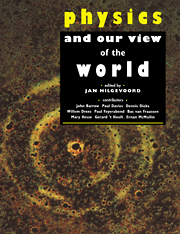Book contents
- Frontmatter
- Contents
- Foreword
- Introduction
- 1 Questioning the answers or Stumbling upon good and bad Theories of Everything
- 2 Theories of Everything
- 3 The scientific view of the world: introduction
- 4 Enlarging the known world
- 5 The world of empiricism
- 6 Has the scientific view of the world a special status compared with other views?
- 7 Quantum theory and our view of the world
- 8 Interpretation of science; science as interpretation
- 9 Problems in debates about physics and religion
- 10 The mind of God
- 11 The sources of models for God: metaphysics or metaphor?
- Discussion
- Notes on contributors
- Bibliography
- Index
5 - The world of empiricism
Published online by Cambridge University Press: 04 December 2009
- Frontmatter
- Contents
- Foreword
- Introduction
- 1 Questioning the answers or Stumbling upon good and bad Theories of Everything
- 2 Theories of Everything
- 3 The scientific view of the world: introduction
- 4 Enlarging the known world
- 5 The world of empiricism
- 6 Has the scientific view of the world a special status compared with other views?
- 7 Quantum theory and our view of the world
- 8 Interpretation of science; science as interpretation
- 9 Problems in debates about physics and religion
- 10 The mind of God
- 11 The sources of models for God: metaphysics or metaphor?
- Discussion
- Notes on contributors
- Bibliography
- Index
Summary
My topics are the relation between science and myth, and the possibility of empiricism as an approach to life as well as to science. But philosophy is a thoroughly historical enterprise, a dialogue that continues in the present but is always almost entirely shaped by our past. So I will devote the first half of this chapter to setting the historical stage.
Two philosophical traditions
There are two main traditions in philosophy about science and about our knowledge of nature; I'll refer to them as realist metaphysics and empiricism. Both of these can be approached more narrowly as concerning how we should understand science. But we can also think of them more broadly as concerned with making sense of the world and, at the same time, of our attempts to make sense of the world.
For the realist, science is a journey of discovery. In fact, realists think of philosophy and science as jointly trying to uncover what is really going on in nature, even ‘behind the scenes’ so to speak. And at the same time, the realist sees science as aiming at real understanding of how nature works, and why it is the way it is. The two aims, of discovering what the world is like, and understanding or making sense of it, are not automatically the same! But for realism there is no tension between them — they are happy to identify the What and the Why.
- Type
- Chapter
- Information
- Physics and our View of the World , pp. 114 - 134Publisher: Cambridge University PressPrint publication year: 1994
- 12
- Cited by



